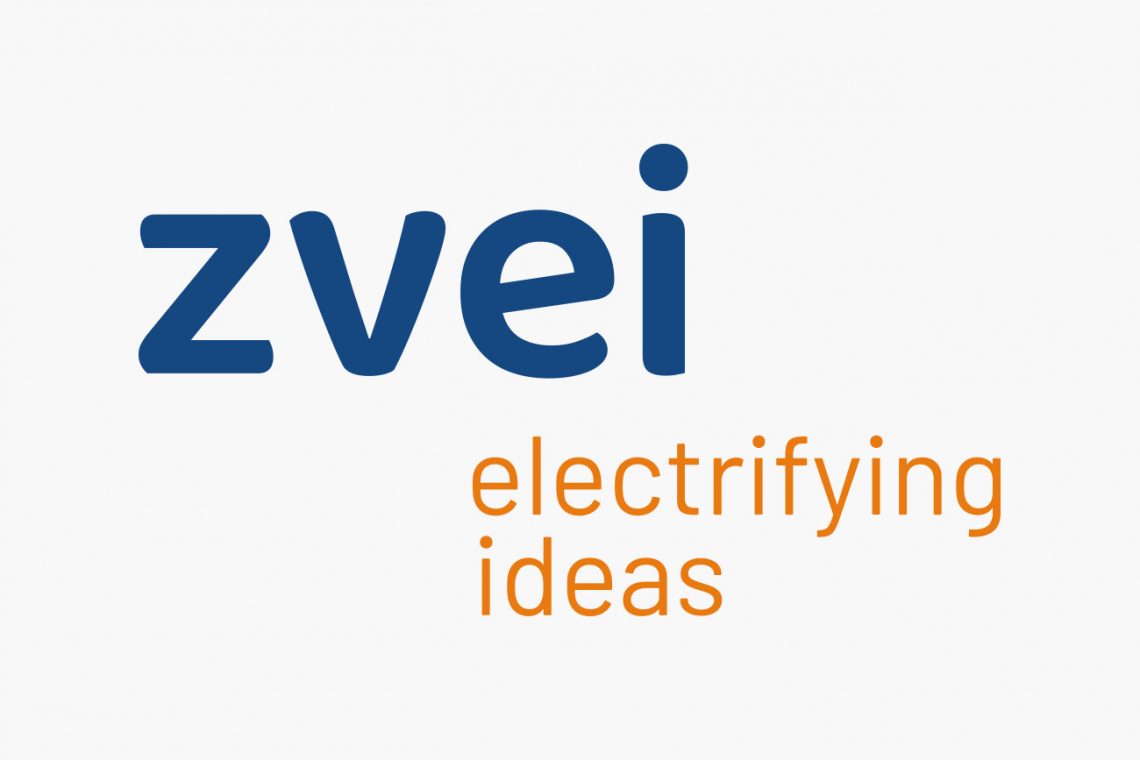Another increase in orders for the German electrical and digital industry
In May 2025, the German electrical and digital industry recorded a 2.0% increase in orders compared to the previous year. "Even though the latest growth was significantly more moderate than in April and March, it was still the third consecutive increase in orders overall," said ZVEI Chief Economist Dr. Andreas Gontermann. While foreign orders increased by 5.6 percent, domestic orders fell by 2.6 percent. New orders from the eurozone (+5.5%) and from third countries (+5.8%) increased more or less equally in May.
In the first five months of this year combined, the value of orders was 4.9% higher than in the same period last year. Orders from domestic customers increased by 4.4%. Incoming orders from abroad rose by 5.3% year-on-year from January to May. Business with countries outside the single currency area (+5.9%) performed better than business with the eurozone, which grew by 4.4%.
Adjusted for price effects, the production of electrical and electronic goods in Germany exceeded the previous year's level by 3.1% in May 2025. However, for the entire period from January to May of this year, there was still a year-on-year decline of 1.9%.
The turnover of German electrical and digital companies increased by 4.3% in May 2025 compared to the previous year, generating 17.7 billion euros. Of this, 8.1 billion euros (+3.1%) was generated in domestic business. 9.6 billion euros was attributable to sales to foreign customers, which therefore grew more strongly (+5.2%). While sales to the eurozone rose by 16.1% to 4.1 billion euros in May, business with countries outside the European single currency fell by 0.8% year-on-year to 5.5 billion euros.
In the first five months of 2025 as a whole, aggregated industry turnover totaled 89.7 billion euros, falling slightly short of the previous year's figure by 0.4%. At EUR 41.6 billion, domestic revenue between January and May was 3.1% lower than in the previous year, while international revenue rose by 1.8% to EUR 48.1 billion. Business with the eurozone (+ 4.1% to €19.4 billion) was significantly stronger than business with third countries (+ 0.5% to €28.7 billion).
The forward-looking production plans of electrical and electronics companies in Germany increased slightly in June: Compared to May, the balance of companies planning to expand or reduce their output in the next three months increased by one to plus eight percentage points. Employment plans also increased slightly. Most recently, the German electrical and digital industry had 880,900 employees - 2.0% fewer than a year ago. The number of employees on short-time work currently totals 39,500.
The business climate in the German electrical and digital industry improved in June 2025. "Both the assessment of the current situation and general business expectations were more favorable than in the previous month. On balance, the latter even turned positive again," says Gontermann. The more specific export expectations remained unchanged in June.
NIS-2 implementation: cyber defense needs expertise
 Sarah Bäumchen, ZVEI Managing DirectorSarahBäumchen, ZVEI Managing Director, criticizes the current draft bill on NIS-2 implementation. "The threat situation in cyberspace is escalating! The assessment by ENISA and BSI clearly shows this. Ransomware, DDoS, supply chain attacks: our critical infrastructures are under constant attack. Good regulation can help - but only if it is designed together with industry. However, instead of finding solutions with the involvement of industry expertise, regulation is to be driven forward single-handedly - at a cost of billions to the economy! The NIS2UmsuCG draft ignores key proposals from the electrical and digital industry. The solutions have long been on the table:
Sarah Bäumchen, ZVEI Managing DirectorSarahBäumchen, ZVEI Managing Director, criticizes the current draft bill on NIS-2 implementation. "The threat situation in cyberspace is escalating! The assessment by ENISA and BSI clearly shows this. Ransomware, DDoS, supply chain attacks: our critical infrastructures are under constant attack. Good regulation can help - but only if it is designed together with industry. However, instead of finding solutions with the involvement of industry expertise, regulation is to be driven forward single-handedly - at a cost of billions to the economy! The NIS2UmsuCG draft ignores key proposals from the electrical and digital industry. The solutions have long been on the table:
No national solo efforts, but European harmonization: in this issue too, Europe is well advised to push for a single internal market with clear standards. Europe should think of itself as a unified whole rather than the sum of its individual states.
Recognition of existing standards such as ISO 27001 instead of bureaucratic overkill: Clear standards thrive not least on relying on tried and tested standards instead of constantly creating new ones that first have to prove themselves in practice.
Central EU-wide reporting platform instead of patchwork: In order to be able to ward off attacks, it is crucial to arm yourself against existing risks in good time. A central reporting platform saves time and effort because critical information does not have to be collected and compared from different sources.
Avoiding gold plating, which unnecessarily burdens companies: For NIS-2 to work as a protection mechanism, it is important not only to create a common framework, but to work towards preventing unnecessary over-regulation. This often results from efforts to complicate EU requirements through overly stringent and often additional national interpretations.
The current draft bill largely ignores these practical reforms proposed by the electrical and digital industry. The consequences are fatal: over €2.3 billion in annual compliance costs are imminent - and this with a lack of involvement of those who are on the digital front line every day. This is not only inefficient, it sends the wrong signal when it comes to increasing the resilience of our business location.
Conclusion: Anyone who is serious about cyber security must take the industry seriously. Legislators would be well advised to involve them closely in this issue, as they provide indispensable building blocks for our critical digital infrastructure. If the federal government continues to ignore input from industry, regulation will quickly turn into unnecessary risk!"
Industry needs bridges, not barriers: ZVEI urges further negotiations between EU and USA
Wolfgang Weber, Chairman of the ZVEI Executive Board, comments on US President Donald Trump's tariff announcement:
"The announcement to impose a 30 percent tariff on EU goods from August 1 is a bitter setback. Such drastic tariffs harm growth, innovation and investment on both sides of the Atlantic."
"The EU and the US must now use any remaining time to reach a trade agreement - a deal on an equal footing. All EU member states must stand united behind the EU Commission so that it can act confidently in the negotiations."
"If no agreement is reached, prepared countermeasures must be implemented consistently but with a sense of proportion. The aim must remain to avert further damage through negotiations - also in close cooperation with the G7 and other like-minded partners." The importance of the US market for the German electrical and digital industry is huge: the US sales market is the most important for goods from the German electrical and digital industry alongside the Chinese market. The export volume amounted to 25 billion euros in 2024, accounting for ten percent of all exports in the industry.
At the same time, the USA is the fifth-largest supplier for the German electronics market. Imports amounted to 12.6 billion euros in 2024.
Dates
| Meeting date | Name of the meeting | Venue |
| September | ||
| 02.09.2025 | Overview of the requirements of the CSRD/ESRS | Online |
| 05.09.2025 | IFA 2025 Trade fair | Berlin |
| 09.09.2025 | Introduction Double materiality analysis for sustainability reporting according to CSRD | Online |
| 10.09.2025 | The new Machinery Directive: Cybersecurity / Protection of machinery against corruption | Online |
| 11.09.2025 | REACH obligations for the electrical and digital industry | Online |
| 16.09.2025 | Industry-specific material compliance requirements / targeted insights for selected industries | Online |
| 17.09.2025 | Smart metering: From the basics to application | Online |
| 23.09.2025 | Introduction to the ESRS topic standards (CSRD) | Online |
Contacts
Semiconductors Association
Lyoner Street 9
60528 Frankfurt am Main
Tel. 069/6302-276/-251
Fax 069/6302-407
e-mail
Trade Association PCBs Components and Systems
Lyoner Street 9
60528 Frankfurt am Main
Phone 069/6302-437
Fax 069/6302-438
e-mail





